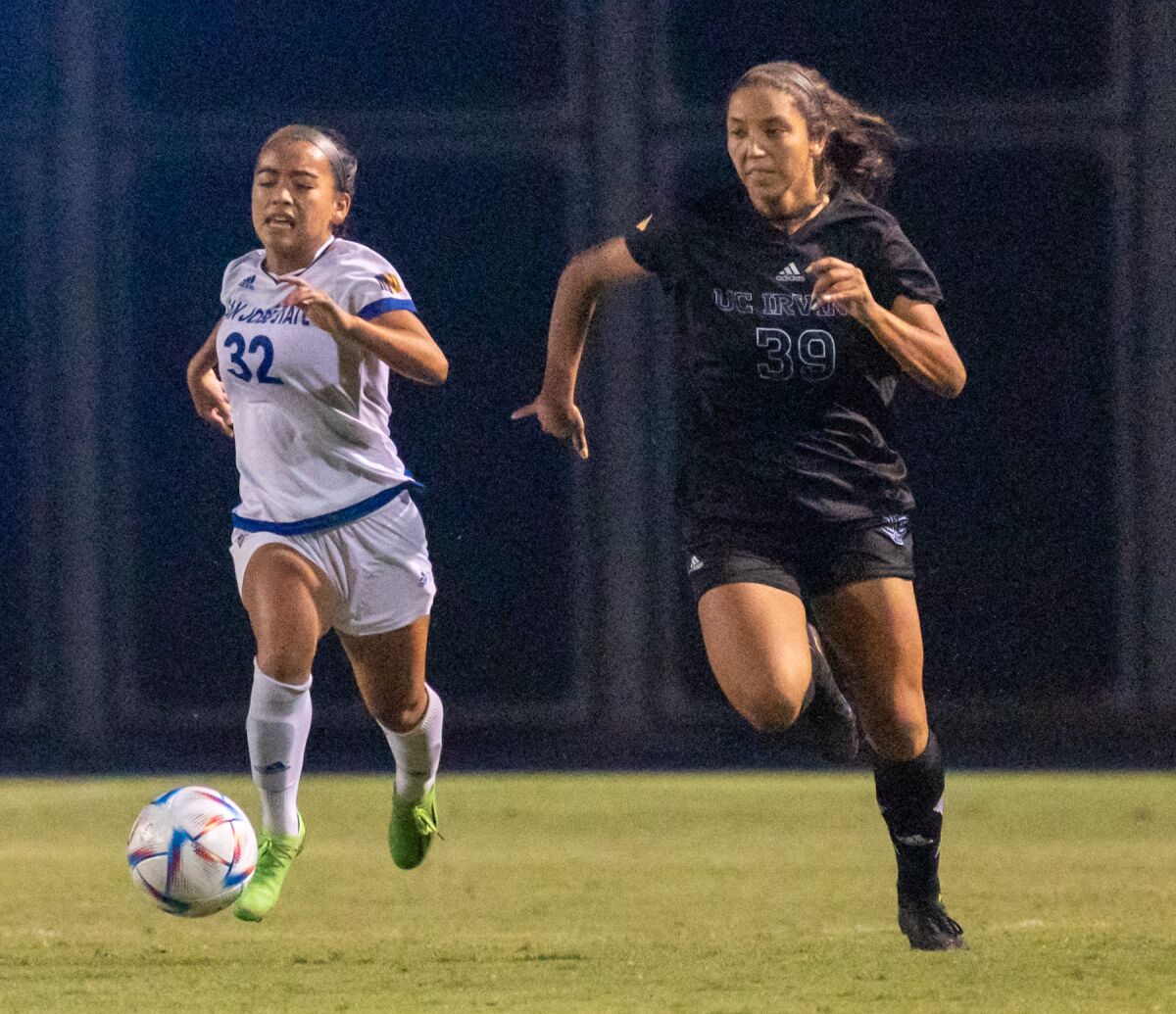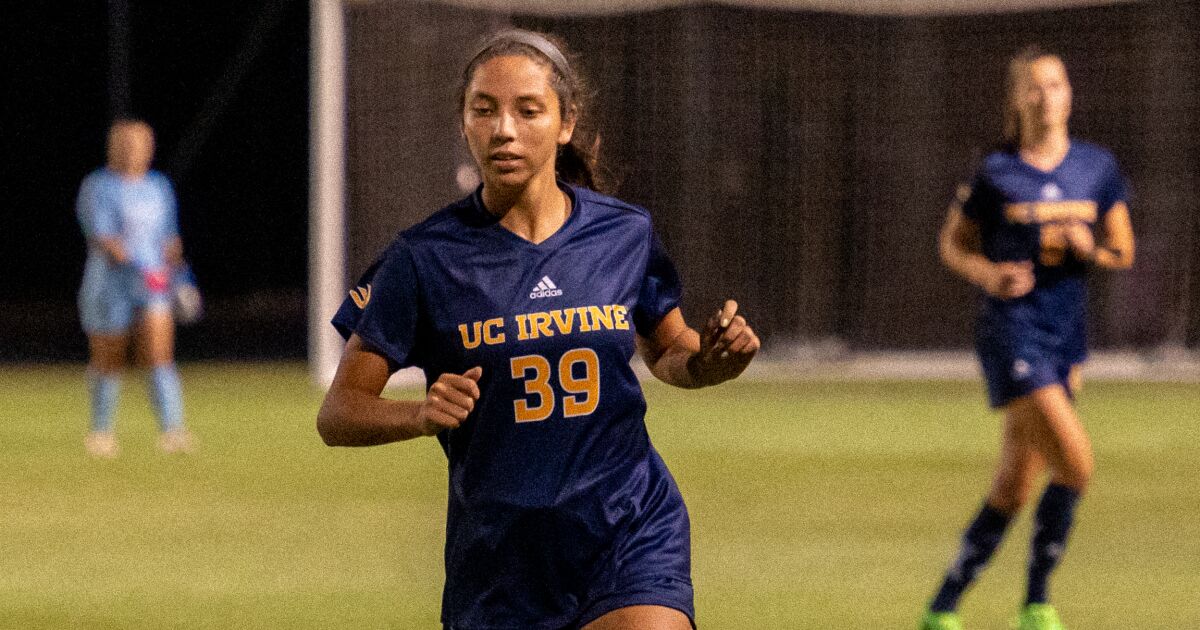UC Irvine women’s soccer leads charge to find stem cell donor as teammate fights cancer
It didn’t take Scott Juniper long to know he wanted Jenika Davis on his team. The UC Irvine women’s soccer coach saw an exciting attacking wide player who never shied away from defenders. She charged forward, powering through any anxiety, and welcomed the challenge of beating the last player.
Davis is now using that same fearlessness in a much tougher battle.
The freshman midfielder/forward was diagnosed with acute myeloid leukemia in October and has already begun chemotherapy treatments. While Juniper said doctors have reported that Davis is responding well to treatments, she needs a blood stem cell transplant to conquer the disease.
Davis’ teammates are leading a charge to find a donor by partnering with Be The Match, an organization that pairs patients battling blood cancers with donors for bone marrow or blood stem cell transplants. The women’s soccer team helped register 97 potential donors during a recent UC Irvine men’s basketball game, explaining to fans that it would only take five minutes to potentially save a life.
Potential donors swabbed the inside of their cheek, and samples were sent to a lab for testing. Be The Match reaches out to registered donors if their sample is determined to be a genetic match for one of the roughly 12,000 patients like Davis looking for a donor.
“Everyone I went up to was so cooperative and so empathetic,” said freshman midfielder Mirayah Villalpando, one of Davis’ three roommates. “A lot of people were just asking a little bit more about her story.”
When Villalpando met Davis on their official visit to Irvine, she knew they would be fast friends. Positive energy radiated off the 5-foot-7 winger. She cracked jokes that left teammates and coaches doubled over.
So when roommates started noticing that Davis barely had the energy to get out of bed during preseason training, they grew concerned. The house jokester had fallen silent. She wasn’t eating as much. She told her roommates she didn’t feel sick, but just didn’t feel like herself.
The training was expected to test athletes physically, but Juniper noticed Davis wasn’t bouncing back as expected. Villalpando wondered if it was her mental health.
Trainers noticed bruising that couldn’t be explained through soccer and brought Davis in for blood work. The tests confirmed an AML diagnosis.
“It was devastating when we officially found out about it,” Villalpano said. “We were all just in shock and the whole team as well.”
After learning of Davis’ diagnosis, the athletic department dispatched doctors and counselors to meet with the team. It was a hard discussion at first, Juniper said. But learning about the situation empowered Davis’ teammates to help, and they were connected to Be The Match, which already had a relationship with UCI.
People in good health from ages 18 to 40 are eligible to join the registry by signing up, receiving a swab kit in the mail and returning it. If identified as a potential match, donors are usually asked to donate blood stem cells through a process similar to donating platelets. Only about 15% of donors, typically those matched with pediatric patients, will be asked to donate bone marrow.

UC Irvine’s Jenika Davis (39) played in five games this season and is now undergoing chemotherapy treatments.
(Cesar Landeros / UC Irvine Athletics)
Chris Chen, an account manager for Be The Match, said there are about 9 million people in the national registry, and it is the most diverse registry in the world, but it still is not enough. According to Be The Match, patients of Black or African American descent have only a 29% chance of finding a match, while Asian or Pacific Islander patients have a 47% chance compared to the 79% chance of a white patient. Because the matching process for blood stem cells and bone marrow is dependent on tissue type, not simply blood type, growing the number of donors of different and mixed ethnicities is critical in finding potential matches.
“The more people that join the registry, the better odds our patients can have in finding a matching donor,” Chen said.
While Davis, who is Filipino and Native American, awaits a match, she is undergoing chemotherapy treatments. After playing in five games and notching an assist in a victory against San Jose State on Sept. 2, Davis watched from afar as her teammates rebounded from a sixth-place regular-season Big West finish to claim Irvine’s second consecutive conference tournament title. The Anteaters matched the best postseason finish in program history by advancing to the third round of the NCAA tournament, upsetting USC in the first round and defeating Brown on penalty kicks in the second.
Players returned to their phones after big games with long text message strings of Davis’ minute-by-minute analysis. The team hung Davis’ No. 39 jersey on their bench, and teammates wrote “JD 39” on the tape around their wrists.
“You’re thinking about her every day,” Juniper said. “This is genuinely life threatening so it doesn’t get any more significant than that. … We referenced her a little bit before games to be able to remember what she’s going through and how can we play in a way that would inspire her or how can we be equally inspired by the strength and the fight that she was showing.”
Villalpando and her other roommates visited the hospital on Davis’ birthday recently. They painted, ate snacks and told jokes like old times. Villalpando said they rarely discuss Davis’ treatments, but when it comes up, the fearless winger flashes the same fight coaches and teammates remember from the field.
“I’m going to be fine,” she tells her teammates. “I know I’m going to survive this.”
To register for Be The Match, go to my.bethematch.org/teamjenika or text TeamJenika to 61474.
For all the latest Sports News Click Here
For the latest news and updates, follow us on Google News.

